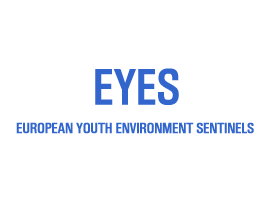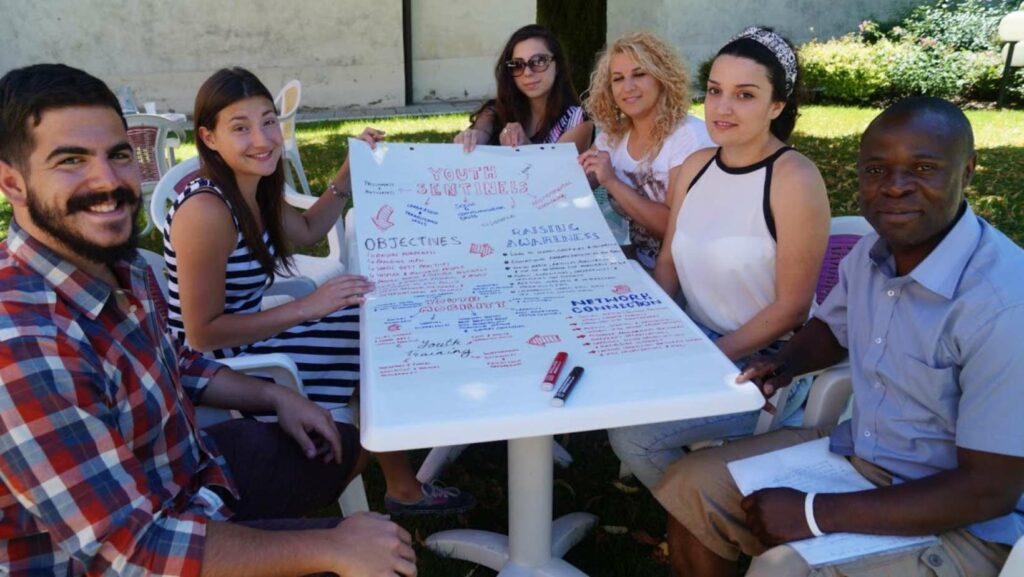
AT A GLANCE
The EYES project aims to put the civic participation of young Europeans at the service of health and environment.
By offering young people from diverse backgrounds an opportunity to interact, share knowledge and debate, this proposal aims at reducing the distance between citizens and Europe – both as an institution and as a combination of communities and cultures.
The main objective is to involve youth workers active in the field of health promotion and protection of the environment, and to ensure that their views are heard at European level. To do this, mixed pairs of “sentinels” (oberver, alert and local stakeholders on topics of health and environment launchers) will be formed by each of our partners. Their participation in activities under the project is given a “multiplier” role through local initiatives: these pairs will give young people and others in their community the opportunity to be active on issues related to health and the environment, and to make recommendations at the local, national, and European levels.

OBJECTIVES
Accordingly with the objectives and goals of mobility projects supported by the Erasmus program, EYES aims at vehiculating a strong intercultural and European dimension. The 40 “sentinels” to be brought to meet come from diverse backgrounds, thus improving their knowledge and understanding of other cultures and giving them the opportunity to establish a European network. In addition, their active participation on topics of European interest will be expected to foster a sense of European identity and citizenship. The geographical coverage of the project – which goes beyond the borders of the European Union (Western Balkans and Caucasus) – will further promote this common identity in an enlarged Europe.
By experiencing a sense of belonging to the European Union more deep and meaningful, participants will gain the confidence to actively take part in the (local and European) democracy.
ACTIVITIES
International Seminar, 21-28 June 2015: the seminar will be held in Vicenza (Italy) and will be co-organised by ALDA and its partners. The focus will be on non-formal learning methods. During the eight-day event, participants will:
- Expose the major health and environmental problems identified in their territories, and will be encouraged to present new ideas creatively.
exchange best practices on the topic - Meet with experts and actors active in the fields of health and environment.
- Participate in various seminars and workshops on topics such as waste management, organic food, local production, management of mountain trails.
- Visit the Lake Fimon (see: http://www.provincia.vicenza.it/ente/la-struttura-della-provincia/servizi/beni-ambientali/lago-di-fimon), prehistoric site whose environmental balance and ecosystem are under threat. A project to protect the area (funded by LIFE) is being implemented.
- Actively participate in Festambiente festival (annual festival dedicated to environmental issues, see: http://www.festambiente.it/), where they can meet different players and participate in workshops (education for sustainable development, recycling, carpooling, energy renewable, etc.).
- Alongside the focus on health and environmental issues activities, the seminar will lead to many intercultural exchanges, whether in connection with the activities of the seminar or during periods of free time participants.
Capitalisation and local initiatives: the results of the international seminar should be the basis for “sentinels” to implement local initiatives involving young people and citizens of all ages in activities to protect the environment.
Maximisation of the impact of the international seminar and the multiplier effect of this support sentinel aims.
Ultimately, it is expected that the initiatives taken downstream of the international seminar are likely to turn into projects within the framework of the Erasmus program +.
Following the implementation phase, a comprehensive evaluation of the project will be the completion of questionnaires and interviews online. Finally, a booklet will be prepared to help spread the project results.